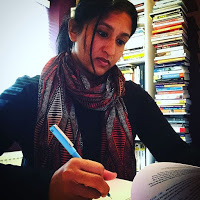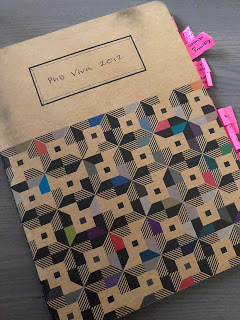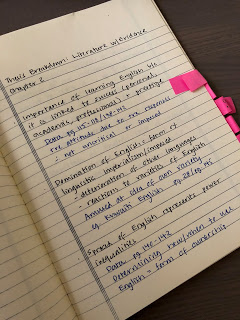PhD Defenses around the world: A viva in linguistics from England
 Today, I have the pleasure of inviting Dr. Ayesha Kamal to share the story of her PhD defense. Ayesha earned her PhD in Applied Linguistics in 2012 and wrote her thesis, “Perceptions of Globalization among English Language Students at Kuwait University: Voices of Ownership,” under the supervision of Dr. Adrian Holliday. Her research interests include language and identity, intercultural communication, and women’s empowerment. She works as a freelance writer and speaker. In her free time, she is a fitness enthusiast and active Gracie Jiu-Jitsu practitioner.
Today, I have the pleasure of inviting Dr. Ayesha Kamal to share the story of her PhD defense. Ayesha earned her PhD in Applied Linguistics in 2012 and wrote her thesis, “Perceptions of Globalization among English Language Students at Kuwait University: Voices of Ownership,” under the supervision of Dr. Adrian Holliday. Her research interests include language and identity, intercultural communication, and women’s empowerment. She works as a freelance writer and speaker. In her free time, she is a fitness enthusiast and active Gracie Jiu-Jitsu practitioner.
Twelve hours earlier I had been lying on the floor in our living room telling (more like wailing to) my husband, “I give up. I just can’t do it. I have nothing left inside me.” After that momentary pity party, I locked myself in my office and worked all night, checking, double-checking, triple-checking everything. Finally, just before the break of dawn, I submitted my thesis to my supervisor. I was done. Now on to the next step, wait for the date for my PhD defense, or viva.
I enjoyed my newfound freedom for a couple of weeks, and then I received my viva date. The anxiety started once again. For a moment it felt like I had forgotten everything. The panic was real and relentless until somebody (I wish I remembered this person’s name) I met at an academic conference said to me, ‘You’ll be fine. It’s your research. Just defend your work.’
My viva date was approaching. I got ready to fly to England from Kuwait, making sure to keep my thesis in my carry-on. My flight landed at Heathrow. I gathered my luggage and took the Heathrow Express train to Paddington station, then a taxi to Victoria station to catch a train to Canterbury East and then another taxi to my hotel – planes, trains, and automobiles indeed.
I was glad I came a few days early to get over any jet lag. It felt strange being in Canterbury with no actual work, well, aside from the biggest task of my life – defend my thesis.
Although I had already marked up my thesis, my nerves were getting the best of me. I felt like I needed to do more. I decided to take it one step further. I bought (yet) another notebook and started to break my thesis down. I tried to put myself in the examiner’s shoes and started to ask myself basic questions and write down my responses: What is your thesis about? Why did you choose this topic? I then broke each chapter down, highlighting the main points and noting page numbers so that I could quickly refer to them and point my examiners to them if needed. This task took two days of non-stop work, but it was worth it. Once I had completed this dissection, I felt in control. I knew my thesis inside out. All I needed to do now was not lose my nerve and defend it confidently.
On the morning of my viva, after a quick run to release some of my nervous energy and a light breakfast, I got ready and headed to Canterbury Christ Church University. I arrived almost an hour early. I had to consciously stop myself from reading my thesis again. I popped in my headphones and put on my go to focus song, ‘Lose Yourself’ by Eminem. The opening lines were: ‘Look, if you had one shot or one opportunity to seize everything you ever wanted in one moment, would you capture it or just let it slip?’ Good question Eminem. Good question. I was going to capture it. I was ready.
Just as the song ended, I saw my supervisor walk up to me. It was time. We walked into the examination room. I met my internal and external examiners and after a bit of introductory chatter, we got started. Throughout the viva my supervisor sat behind me; I couldn’t see him, but the occasional crinkle of a chocolate wrapper let me know that he was there the whole time.
I was nervous, but I was also excited. I had not expected that feeling. This was my chance to get to talk about my work, talk about something I was so passionate about. The excitement carried me through.
The examiners worked through my thesis from beginning to end. They asked about how I came to choose this topic and wanted to know more about the research setting. They asked me about why I used certain terms and for my interpretation of their definitions as used in the thesis. I was asked to go over my research methodology thoroughly. Then we spent quite a bit of time discussing the data, my analysis, and ultimately my conclusions.
They were very thorough. It was not an easy viva, but despite all the questions, it did not feel like an interrogation. Rather, it felt like an intimate conversation with professionals who were genuinely interested in what I had to say. When questions were asked, they were not put forward to attack me, they were to ask for clarification and also to know my intentions behind what I wrote, why I chose certain things, and how I came to my conclusions.
My preparation paid off. I was able to answer all their questions and address any of their concerns. The new notebook with my most recent breakdown of my thesis was invaluable. Not only did writing it allow me to really highlight and review the most important points of my thesis, it gave me confidence to speak about them too. I answered the questions deliberately and with conviction.
I thought I would be relieved once it was over, but then the next difficult thing happened – the waiting. The waiting felt like forever. After almost half an hour, I was called back in. I thought there would be a bit of small talk, but there was not. The first thing they said was, ‘Congratulations.’ I immediately felt an overwhelming relief. My examiners kept their final comments short, so I didn’t have to wait too long to call my family and tell them – I was a doctor.
I was very fortunate to have had an incredible support network around me, particularly my supervisor Dr. Adrian Holliday, my husband, and my family. However, the thing that really carried me through the viva and got my mindset in the right place was the advice of that one random person, ‘You’ll be fine. It’s your research. Just defend your work.’


